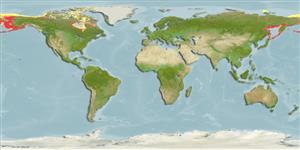Anarhichas orientalis Pallas, 1814
Bering wolffish
把你的觀察加入 Fish Watcher
| Native range | All suitable habitat | Point map | Year 2050 |

|
| This map was computer-generated and has not yet been reviewed. |
| Anarhichas orientalis AquaMaps Data sources: GBIF OBIS |
分類 / Names 俗名 | 同種異名 | Catalog of Fishes(屬, 種) | ITIS | CoL | WoRMS | Cloffa
Teleostei > Perciformes/Zoarcoidei (Eelpouts and pricklebacks) 鱸形目 (Eelpouts and pricklebacks) > Anarhichadidae (Wolffishes) 狼鳚科 (Wolffishes)
Etymology: Anarhichas: Greek, anarhichaomai = to climb up.
More on author: Pallas.
Etymology: Anarhichas: Greek, anarhichaomai = to climb up.
More on author: Pallas.
Environment: milieu / climate zone / depth range / distribution range 生態學
海洋 居於水底的; 深度上下限 0 - 100 m (Ref. 50550), usually 10 - 70 m (Ref. 56527). 溫帶; 88°N - 40°N, 135°E - 60°W
分布 國家 | FAO區域 | 生態系 | 發現紀錄 | Point map | 簡介 | Faunafri
North Pacific: Hokkaido, Japan and Sea of Okhotsk to the Bering Sea. Arctic Canada.
北太平洋: 日本北海道與鄂霍次克海到白令海。 加拿大北極圈。
北太平洋: 日本北海道與鄂霍次克海到白令海。 加拿大北極圈。
大小 / 重量 / 年齡
簡短描述 檢索表 | 型態特徵 | 形態測量圖
背棘 (總數) : 83 - 88; 臀棘: 0; 臀鰭軟條: 53 - 54. Four pairs of strong canines on anterior parts of both jaws; molar teeth on prevomerine and palatal bones and posterior part of lower jaw. Dorsal fin without soft rays. Pelvic fins absent.
在雙顎的前部上的四對強的犬齒; 臼齒牙齒在 prevomerine 與上顎音硬骨與下頜的較後面的部分。 沒有軟鰭條的背鰭。 腹鰭不存在。
在雙顎的前部上的四對強的犬齒; 臼齒牙齒在 prevomerine 與上顎音硬骨與下頜的較後面的部分。 沒有軟鰭條的背鰭。 腹鰭不存在。
Found on rocky bottoms (Ref. 559). Benthic (Ref. 58426). Feeds on hard-shelled invertebrates (Ref. 28499).
棲息於岩石底部.。 (參考文獻 559) 底棲的.(參考文獻 58426) 吃具有硬殼的無脊椎動物。 (參考文獻 28499)
棲息於岩石底部.。 (參考文獻 559) 底棲的.(參考文獻 58426) 吃具有硬殼的無脊椎動物。 (參考文獻 28499)
Life cycle and mating behavior 成熟度 | 繁殖 | 產卵場 | 卵 | 孕卵數 | 仔魚
Eggs are very large. 北太平洋: 日本北海道與鄂霍次克海到白令海。 加拿大北極圈。
主要參考資料
Upload your references | 參考文獻 | 合作者 | 合作者
Masuda, H., K. Amaoka, C. Araga, T. Uyeno and T. Yoshino, 1984. The fishes of the Japanese Archipelago. Vol. 1. Tokai University Press, Tokyo, Japan. 437 p. (text). (Ref. 559)
CITES
Not Evaluated
對人類具威脅
無害處的
人類使用
FAO - Publication: search | FishSource |
更多資訊
Population dynamics
成長參數
Max. ages / sizes
Length-weight rel.
Length-length rel.
長度-頻率
Mass conversion
入添量
豐度
成長參數
Max. ages / sizes
Length-weight rel.
Length-length rel.
長度-頻率
Mass conversion
入添量
豐度
Anatomy
鰓區
Brain
Otolith
鰓區
Brain
Otolith
Physiology
Body composition
Nutrients
耗氧量
游泳類型
游泳速度
Visual pigments
Fish sound
Diseases & Parasites
Toxicity (LC50s)
Body composition
Nutrients
耗氧量
游泳類型
游泳速度
Visual pigments
Fish sound
Diseases & Parasites
Toxicity (LC50s)
Genetics
遺傳學
Heterozygosity
遺傳率
遺傳學
Heterozygosity
遺傳率
工具
E-book | 野外調查 | 長度- 頻率 Wizard | 生活- 歷史的工具 | 分布圖 | Classification Tree
| Catch-MSY |
特別的報告
下載 XML
網路資源
AFORO (otoliths) | Aquatic Commons | BHL | Cloffa | BOLDSystems | Websites from users | 檢查 FishWatcher | CISTI | Catalog of Fishes: 屬, 種 | DiscoverLife | ECOTOX | FAO - Publication: search | Faunafri | Fishipedia | Fishtrace | GenBank: 基因組, 核甘 | GloBI | Google Books | Google Scholar | Google | IGFA World Record | MitoFish | OceanAdapt | Otolith Atlas of Taiwan Fishes | PubMed | Reef Life Survey | Socotra Atlas | 樹狀分類階層 | Wikipedia: 去, 搜尋 | World Records Freshwater Fishing | Zoobank | 動物學的記錄
Estimates based on models
Preferred temperature (Ref. 123201): -0.6 - 6.9, mean 2.3 °C (based on 1276 cells).
Phylogenetic diversity index (Ref. 82804): PD50 = 0.5938 [Uniqueness, from 0.5 = low to 2.0 = high].
Bayesian length-weight: a=0.00389 (0.00180 - 0.00842), b=3.12 (2.94 - 3.30), in cm total length, based on all LWR estimates for this body shape (Ref. 93245).
營養階層 (Ref. 69278): 3.8 ±0.4 se; based on diet studies.
回復力 (Ref. 120179): 低的, 最小族群倍增時間4.5 - 14 年 (Assuming tm>5).
Fishing Vulnerability (Ref. 59153): High to very high vulnerability (67 of 100).




